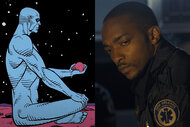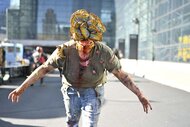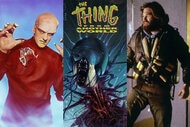Create a free profile to get unlimited access to exclusive videos, sweepstakes, and more!
The dysfunctional sex of Watchmen

Watchmen is a beloved comic by Alan Moore and Dave Gibbons, though it’s arguably harder to read these days than it used to be. It’s one of those examples of something mocking a genre that becomes one of the greatest examples of the genre itself. Published between September 1986 and October 1987 by DC Comics, it looked at an alternate timeline where the United States won in Vietnam because of a man (Dr. Manhattan) who had been transformed into a superhuman figure thanks to a lab experiment gone awry. In this reality, costumed vigilantes are a regular feature of daily life, fighting crime on the street level. When the story begins, costumed vigilantes have been outlawed, the U.S. is heading towards WWIII with the Soviet Union and those who were once regarded as heroes have been forced to come to terms with why they dressed up in the first place.
It’s an interesting comic to re-read right now in the wake of #MeToo, where many fans are returning to old favorites and examining their sexual politics. Whether or not one can or should judge earlier works through a 2019 lens is a very personal decision. Whether or not you feel differently about said work after revisiting it is personal as well.
Watchmen has always been harsh in regards to its depiction of sexuality. It’s treated as a brutal and rather animalistic urge that often ends badly for those involved. Rorschach, born Walter Kovacs, is a ruthless vigilante who wanders the streets taking down criminals. His judgment of people is tough to read. He complains about rampant sexual promiscuity in the world and disparages his landlady as a prime example, a woman who has five children by five different fathers. His mother was a sex worker who he often witnessed with clients from a very young age. She was cruel to him when he interrupted her, and Rorschach comes to hate her for the early sexual awakening her activities caused, tying her up in his feelings. That harsh evaluation of others is a frequent aspect of his characterization, from his concern about whether or not Ozymandias is gay to calling the first Silk Spectre an aging whore. At one point, he relays the anecdote of when he got his mask from a discarded dress, and how he didn’t want to touch it because it was technically women’s clothing. The story doesn’t try to explain away his character, and even the retelling of his history doesn’t attempt to make you sympathize with him. It’s difficult to like him, and you’re not supposed to. In fact, it’s really difficult to like most of these characters, and half the genius of the book is that you still want to find out what happens to them.
Sally Jupiter, A.K.A. Silk Spectre I, is probably the most problematic for the modern reader. Sally was an aspiring model who decided to dress up and fight crime. She craved the spotlight in the way Insta-celebrities do now and tried to turn her crimefighting into notoriety. Sally’s entire self-worth is tied up in her beauty, though one could argue that beauty and sexuality were all the world cared about anyway. She’s proud of the pornographic drawings people made of her and sent her later in her life, telling her daughter Laurie, whom she’s pushed into this career, that "the past, even the grimy parts of it, well, it just keeps on getting brighter all the time." Admittedly, Sally is a product of her time the same way Rorschach is a product of his upbringing. If you read clippings from the time included in the book, one story talks about how wonderful it is to see a woman joining the Minute Men and how hot she is, as well as the fact that criminals are lining up to be taken down by her. There's nothing about keeping the world safe, nothing about how someone else is trying to take justice into their own hands. It’s about whether or not she’s desirable. However, this part of her storyline isn't the hardest pill to swallow.
Consent is a fraught subject, and the attempted rape of Sally Jupiter is a challenging storyline to read, particularly now. Another vigilante known as the Comedian tries to rape Sally, trying to convince her she was asking for it. She’s then saved by another vigilante who admonishes her to cover herself. Oddly, the rape isn’t the most difficult part. It’s that Sally forgives the Comedian and blames herself because of her attraction to him. She loves him and is, as she says, unable to sustain anger at him. It’s awful to read her thoughts and her guilt, thinking that her feelings for him before the rape might have meant that she deserved it or that she caused it.
It’s also difficult to reconcile the fridging of gay characters like Silhouette, who was murdered for her sexuality after being kicked out of the gang when outed. On the one hand, it forced the spotlight onto something that had been swept under the rug for most of modern entertainment history. It addressed characters who were gay as though they actually exist. Imagine! On the other hand, watching what happens to them is awful. We don’t see it, as we do in the opening sequence of the Watchmen film adaptation released in 2009, but we feel it throughout. It’s interesting to note gay characters in the background of scenes in a non-judgmental way, such as the instant of the two men lovingly holding hands in a restaurant, or the moment where it’s mentioned that the iconic photo of the soldier kissing a nurse at the end of WWII was actually Silhouette kissing her partner. These are powerful images that most comic book writers wouldn’t have touched back in the ‘80s.
The more recent series Before Watchmen (which Gibbons and Moore aren’t involved in) goes deeper into the past and explore some of the psychological issues with the characters, but they’re all based on what we’re given here in Watchmen: the idea that sex is less about bonding in most cases and more about distraction. Everyone is asked in interviews and books about whether or not dressing up in costume had a sexual component. Though characters like the first Nite Owl and Sally Jupiter hem and haw about it, it’s later stated that this is absolutely one of the reasons, but it obviously goes deeper than that.
If you look at the idea of dressing up in costume to fight crime, it’s all about identity. It’s covering your face to allow yourself to experience things you might dream about but never do. Sure, sometimes it’s for sex, but sometimes it’s to give yourself the bravery to do something altruistic. Sometimes it lets you do something ugly. These characters are very clearly depicted as needing that push to do things they couldn’t on their own. It’s most apparent in the scenes between Dan Dreiberg (Nite Owl II) and Laurie (Silk Spectre II). They’ve both suffered emotionally since the vigilantes were disbanded, and when they finally attempt to have sex, Dan can’t do it unless he’s in costume. Laurie understands. They’re different people when they’re fighting crime, or at least in those personas. It gives them the confidence they don’t have in everyday life.
Sex itself is examined here, and if you consider it a character all on its own, it goes through a transition. In the beginning, it's dismissed in the plot as animalistic and trashy. There's the ugliness of the attempted rape at the beginning of the book. In one scene, the Comedian kills a woman who is pregnant with his child, and Dr. Manhattan just allows it to happen. Later on, it's regarded as just something to do, mechanical without engaging the emotions or the mind, when Dr. Manhattan and Laurie have sex. At that point, Manhattan’s consciousness has evolved to the point where he can be in many places at once. He’s removed from human emotion, though he tries to please Laurie in bed by becoming multiple versions of himself while also working on an experiment in another room. It’s dispassionate at best, dismissive at worst.
When Laurie and Dan hook up, finally, in their costumes, we start to see a bonding moment, a feeling of camaraderie between partners. Later, when the world has almost ended and their existence almost wiped out, Laurie and Dan have sex to celebrate their lives and their relief at having survived. It’s the deepest connection in the entire story. Ozymandias even speaks about the subject at the end of the book, about how ads get racier and people have more sex during a time of war. He invests in porn and instructs his flunkies to set up investments in baby products as well. Cold as it sounds, it’s actually pretty central to the climax of the story. Facing adversity together makes the world’s people bond and find connection in themselves.
Though Watchmen is a difficult book to re-read, it’s still got something to say about identity and sex that's worth listening to.














